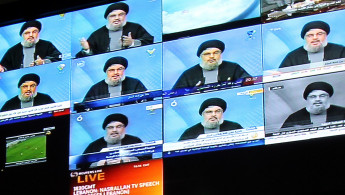Saudi 'pressures' pan-Arab satellite operator to block Hizballah-linked TV
The company operating Arab League-sponsored satellite Arabsat has taken Al-Manar TV, which is affiliated to powerful Lebanese paramilitary group Hizballah, off the air, reportedly at the request of Saudi Arabia.
The channel was stopped from broadcasting through Arabsat on 4 December.
Arabsat also has a dispute with al-Mayadeen TV, another channel Saudi Arabia finds controversial for its support of the Syrian regime and Hizballah.
| Hizballah officials decried Arabsat's decision, calling it a political move aimed at punishing Al-Manar TV for its positions |
The move seems to have been prompted by the intervention of a guest during a talk show broadcasted in April.
The guest had insulted the Saudi royal family and the king.
However, the host was quick to affirm during the episode that the opinion of the guest did not reflect that of Al-Manar TV, in accordance to Lebanese media laws.
At the time, Arabsat did not take any action.
In Lebanon, politicians and media officials alike have criticised the move, not least for bypassing appropriate channels such as the Lebanese Court of Publications or the Arab League.
According to Lebanese newspapers, Arabsat's executive director, a Saudi national, issued the decision unilaterally shortly after the Saudi Minister of Information moved to block the channel and other outlets from airing in Saudi Arabia.
The Telecom Parliamentary Committee in Lebanon held a meeting on Monday, chaired by Hizballah MP Hassan Fadlallah.
The meeting was attended by the country's Ministers of Information and Telecommunications Ramzi Jreij and Boutros Harb and officials from several media outlets and organisations.
Speaking to reporters after the meeting, Fadlallah stressed "the pluralism and freedom of expression in Lebanon."
The MP called on the Lebanese government to raise the issue with executives at Arabsat and Arab League officials.
Hizballah officials earlier decried Arabsat's decision, calling it a political move aimed at punishing Al-Manar TV for its positions, especially against the Israeli occupation of Palestine and the war with "Takfiri" groups, in reference to Hizballah's intervention in Syria against extremists and enemies of the Assad regime.
There were other condemnations of what some have called a Saudi assault on Lebanon's sovereignty and freedoms, including from Information Minister Ramzi Jreij.
Jreij said if the decision was indeed political, then it would be "arbitrary", for failing to go through the recognised legal channels when, as he said, Al-Manar was not in breach of its contract with Arabsat.
Al-Manar TV is reportedly now broadcasting via a Russian-operated satellite as well as via the Internet.
Saudi Arabia owns the largest stake in Arabsat, alongside other Gulf nations such as Kuwait and Qatar.
The company is reportedly now moving its headquarters from Lebanon to Jordan, in a move that appears to be related to the standoff with Hizballah.





 Follow the Middle East's top stories in English at The New Arab on Google News
Follow the Middle East's top stories in English at The New Arab on Google News

![Israeli forces ordered bombed Gaza's Jabalia, ordering residents to leave [Getty]](/sites/default/files/styles/image_330x185/public/2176418030.jpeg?h=a5f2f23a&itok=_YGZaP1z)
